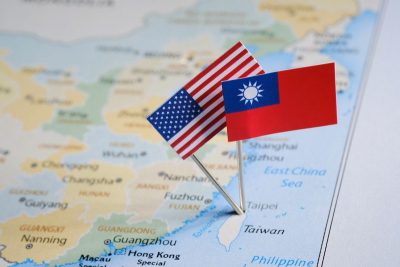Taiwan’s ‘Self-Defense’ Claim against China: Euphemism for US-Backed Aggression?

It’s important to explain the context of the island leadership’s provocative comments in order to better understand why everything isn’t as simple as they try to make it seem.
Taiwan’s self-described “Ministry of National Defense” released a statement on Monday claiming that it reserves the right to “self-defence and to counter attack”, ostensibly in response to the People’s Liberation Army Air Force’s (PLAAF) flights near the island over the weekend, according to Reuters. Taiwan’s authorities, whose “legitimacy” is only recognized by a dwindling handful of countries, don’t have any “self-defense” rights in terms of international law. Rather, this is just a euphemism for US-backed aggression.
It’s important to explain the context of the island leadership’s provocative comments in order to better understand why everything isn’t as simple as they try to make it seem. US Undersecretary for Economic Affairs Keith Krach was just in Taiwan to attend a funeral, which was the second high-profile visit by American officials there following US Secretary of Health and Human Services Alex Azar’s last month. Both trips were carried out in violation of the US’ own policy of only recognizing Beijing as the legitimate government of China.
Two days before Krach’s arrival on 19 September, Florida Senator Rick Scott released a statement on his website introducing the so-called “Taiwan Invasion Prevention Act” (TIPA), which the official website of Congress curiously proves was actually first introduced on 29 July. It therefore appears as though Senator Scott decided to make a media spectacle out of his jointly sponsored bill around the time of his government’s latest diplomatic provocation against China, perhaps hoping to attract maximum attention to his proposed legislation.
About that, TIPA includes a list of policy mandates, the most important being “To authorize the President to use military force for the purpose of securing and defending Taiwan against armed attack, and for other purposes.” Other provisions mention including Taiwan in a “regional security dialogue with…governments of like-minded security partners”, combined military exercises, and a free trade agreement. In other words, Taiwan’s full incorporation into the US’ “Indo-Pacific” strategy that many suspect is a ruse for “containing” China.
It can’t be overstated just how dangerous TIPA would be if it enters into law. The US would essentially reverse its over four-decade-long policy of recognizing Beijing as the only legitimate government of China, thereby turning Taiwan into a military protectorate and thus encouraging it to declare independence with the full support of the American military. Suffice to say, that dark scenario is the stuff of nightmares since Beijing has already make it clear that it wouldn’t accept this under any circumstances.
Senator Scott seems to be keenly aware of this, hence why he apparently timed his TIPA announcement to coincide with Krach’s visit to Taiwan, knowing full well that it would provoke China into at the very least making some harsh political statements condemning this infringement of its territorial integrity. As was also expected, Taiwan tried to artificially manufacture a security crisis over the weekend after the PLAAF’s nearby activities during that time, which in turn was used as the pretext for Monday’s “self-defense” statement.
With this sequence of events in mind, it convincingly appears in hindsight as though a coordinated attempt is being made by anti-communist radicals in the US government and the self-declared Taiwanese one to create a fake security crisis that could then be exploited to push TIPA through Congress with a sense of urgency. Evidently, responsible members of the US government know how dangerous this proposed legislation is, hence why Scott and others have to resort to the speculated political connivance to trick them into passing it.
For these reasons, it’s clear that Taiwan not only lacks the international legal rights to “self-defense”, but that its latest claim to that effect is just a euphemism for US-backed aggression. In fact, it can even be argued that Taiwan might be indirectly meddling in American political affairs by playing along with the script of provoking a fake security crisis with the mainland for the purpose of pressuring congresspeople to pass TIPA as soon as possible. Justice Ginsburg’s passing has distracted Congress, however, so this crafty plan might ultimately fail.
*
Note to readers: please click the share buttons above or below. Forward this article to your email lists. Crosspost on your blog site, internet forums. etc.
This article was originally published on OneWorld.
Andrew Korybko is an American Moscow-based political analyst specializing in the relationship between the US strategy in Afro-Eurasia, China’s One Belt One Road global vision of New Silk Road connectivity, and Hybrid Warfare. He is a frequent contributor to Global Research.
Featured image is from OneWorld

